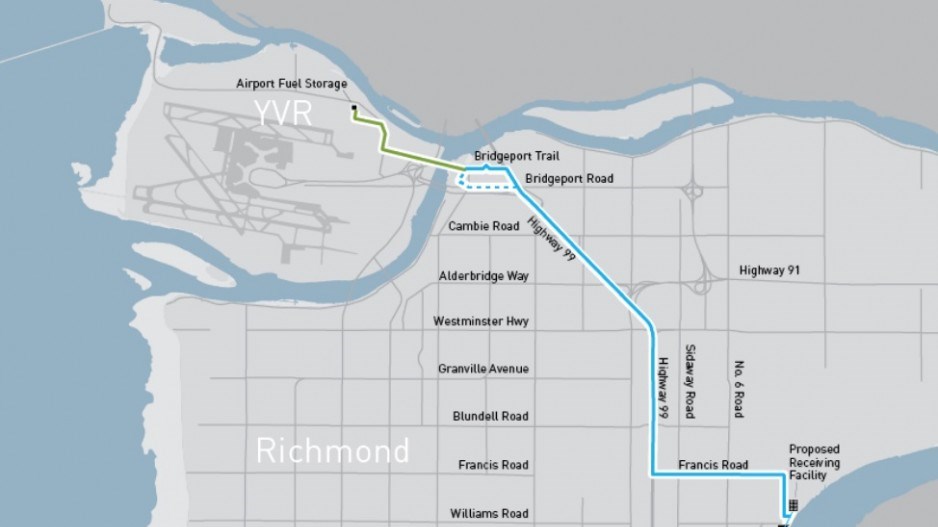A project valued at more than $150 million to build a 13-kilometre pipeline across Richmond to supply Vancouver International Airport (YVR) with jet fuel is in the final approval stages.
City of Richmond staff is drafting a municipal access agreement with the Vancouver Airport Fuel Facilities Corp. (VAFFC) to allow it to build the pipeline on city land. The agreement will also include conditions to protect and maintain streets and other Richmond infrastructure that would run above the pipeline.
Richmond city council is poised to approve the bilateral agreement at a council meeting, likely in the next few months, when it would also grant the project a development permit for a marine terminal and fuel-receiving facility.
Eventually we will have to provide a permit,” Richmond spokesman Ted Townsend told Business in Vancouver.
“We can’t refuse them a development permit. We simply have to come to an agreement on the matters that are covered under a development permit but we can’t refuse them.”
VAFFC, a consortium of 25 airlines that is financing the project, began construction last year on the marine terminal, but the work thus far has been on Vancouver Fraser Port Authority land on the north shore of the Fraser River’s south arm. Part of the land to be used for the terminal is in the city of Richmond, on environmentally sensitive land, Townsend said.
Many British Columbians oppose the construction of any new pipelines in the province because they are concerned about potential environmental damage from pipeline fuel leaks. Jet fuel, however, is said to be easier to clean up than crude oil because jet fuel floats.
The VAFFC project would also replace a 48-year-old spike line from a Kinder Morgan (TSX:KML) site in Burnaby.
“Once they get approval, it is a four-year build, and then we’ll have a very, very good supply, with tankers coming in the south arm [of the Fraser River] and fuel piped to the airport,” Vancouver Airport Authority CEO Craig Richmond said May 10.
“They’ve been thinking about this a long time. We’re happy that they have. I think that’s a good long-term solution.”
Some jet fuel destined for planes that fly out of YVR arrives by tanker, is sent to Kinder Morgan’s Burnaby facility and then gets piped to the airport, Richmond said. The rest is trucked to the airport from the U.S., he added.
The Richmond pipeline would have a shorter route and a larger pipe than the current line. It would eliminate the need for fuel to be trucked to the airport.
“In the summer, right now, we have a lot of trucks that are driving up from Washington [state] to refill our tanks,” Richmond said. “That’s not very sustainable. We’d rather that it be in a pipeline.”
Planning and getting approvals for the pipeline have taken more than a decade. The project was originally forecast to cost $70 million and be completed by 2012.
The provincial and federal governments conducted extensive consultation before they approved the project.
“Our role is fairly limited at this point in terms of influence on the project going forward,” Townsend said.
"We had a whole laundry list of objections [to the project.] We objected to the process itself. We objected to many elements of the project." •
The headline of this story was changed to "Richmond set to approve permit for YVR jet fuel pipeline," from "Richmond set to approve YVR jet-fuel pipeline" to make clear that the City of Richmond does not approve the entire pipeline project, but rather necessary permits.
gkorstrom@biv.com
@GlenKorstrom



